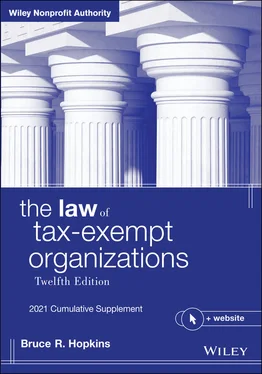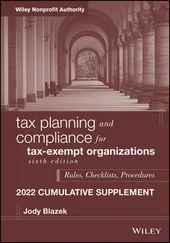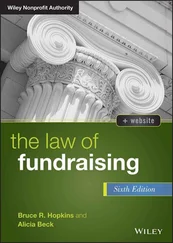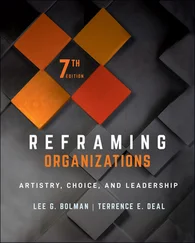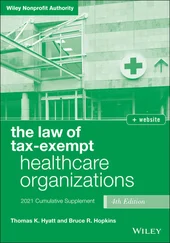Bruce R. Hopkins - The Law of Tax-Exempt Organizations, 2021 Cumulative Supplement
Здесь есть возможность читать онлайн «Bruce R. Hopkins - The Law of Tax-Exempt Organizations, 2021 Cumulative Supplement» — ознакомительный отрывок электронной книги совершенно бесплатно, а после прочтения отрывка купить полную версию. В некоторых случаях можно слушать аудио, скачать через торрент в формате fb2 и присутствует краткое содержание. Жанр: unrecognised, на английском языке. Описание произведения, (предисловие) а так же отзывы посетителей доступны на портале библиотеки ЛибКат.
- Название:The Law of Tax-Exempt Organizations, 2021 Cumulative Supplement
- Автор:
- Жанр:
- Год:неизвестен
- ISBN:нет данных
- Рейтинг книги:5 / 5. Голосов: 1
-
Избранное:Добавить в избранное
- Отзывы:
-
Ваша оценка:
- 100
- 1
- 2
- 3
- 4
- 5
The Law of Tax-Exempt Organizations, 2021 Cumulative Supplement: краткое содержание, описание и аннотация
Предлагаем к чтению аннотацию, описание, краткое содержание или предисловие (зависит от того, что написал сам автор книги «The Law of Tax-Exempt Organizations, 2021 Cumulative Supplement»). Если вы не нашли необходимую информацию о книге — напишите в комментариях, мы постараемся отыскать её.
The Law of Tax-Exempt Organizations, 2021 Cumulative Supplement — читать онлайн ознакомительный отрывок
Ниже представлен текст книги, разбитый по страницам. Система сохранения места последней прочитанной страницы, позволяет с удобством читать онлайн бесплатно книгу «The Law of Tax-Exempt Organizations, 2021 Cumulative Supplement», без необходимости каждый раз заново искать на чём Вы остановились. Поставьте закладку, и сможете в любой момент перейти на страницу, на которой закончили чтение.
Интервал:
Закладка:
p. 79, carryover paragraph. Insert as penultimate sentence:
In an extraordinary application of the commerciality doctrine, a nonprofit organization formed to combat organized theft and fraud that supports opioid and heroin addiction, by utilizing innovative software in conjunction with retailers and law enforcement agencies, was denied recognition of exemption as a charitable entity, with the IRS invoking the doctrine by characterizing the organization as merely providing a “service for a fee to retail stores.” 360.1 The better analysis would have been to recognize exemption as an entity promoting health 360.2 and lessening the burdens of government, 360.3 with services to retailers cast as a means to larger exempt ends. 360.4
(h) Contemporary Perspective on Doctrine
p. 81, note 371, fifth line. Delete an orga‐.
p. 81, note 371, sixth line. Delete nization providing and insert a provider of.
p. 81, note 371, seventh line. Delete an organization in two instances.
p. 81, note 371, eighth line. Delete an organization.
p. 81, note 371, ninth line. Delete and an organization.
p. 81, note 371, tenth line. Insert following closing parenthesis:
operating a tavern (Priv. Ltr. Rul. 202016019), and operating a used car dealership (Priv. Ltr. Rul. 202031010).
p. 82, note 394. Delete 20.12 and insert 20.13.
p. 82, note 395. Insert following existing text:
In one instance, the IRS applied the commerciality doctrine, then also held that much of an organization's activities constituted unrelated business (Priv. Ltr. Rul. 201918019).
p. 82, note 396. Delete text and insert:
For example, the IRS denied recognition as an exempt charitable entity to an organization that operated a banquet center available for fees to the public, on the ground that it was operating an unrelated business (Priv. Ltr. Rul. 201803009), as was the case where the primary activity of an organization was the sale and rental of durable medical equipment (Priv. Ltr. Rul. 201925015) and where an organization provided business development and marketing and consulting services for a fee to various types of nonprofit organizations (Priv. Ltr. Rul. 201925017). In other cases, the IRS revoked exempt status because the organization was engaging in substantially nonexempt activities (Priv. Ltr. Ruls. 201929021, 201926016). In one instance, the IRS applied the commerciality doctrine, where use of the private benefit doctrine would have been more appropriate (Priv. Ltr. Rul. 201941029).
p. 82, note 397, last line. Delete and insert:
303 F. Supp. 3d 1065 (D. Colo. 2018).
Notes
1 330.1 Priv. Ltr. Rul. 201846007.
2 359.1 Priv. Ltr. Rul. 202020024.
3 359.2 Priv. Ltr. Rul. 202021025.
4 359.3 Priv. Ltr. Rul. 202039019.
5 359.4 Priv. Ltr. Rul. 202041009.
6 360.1 Priv. Ltr. Rul. 202021026.
7 360.2 See § 7.6.
8 360.3 See § 7.7.
9 360.4 See § 6.3(b).
CHAPTER FIVE Nonprofit Governance
§ 5.3 Board Duties and Responsibilities (a) Duty of Care (b) Duty of Loyalty (c) Duty of Obedience
§ 5.7 IRS and Governance(c) IRS Ruling Policy
§ 5.3 BOARD DUTIES AND RESPONSIBILITIES
p. 89, second complete paragraph, second line. Insert (or trustee) before first of.
p. 89, second complete paragraph. Insert as last sentence:
These standards mean that board members are expected to regard and treat the nonprofit organization's assets and other resources with the same care with which they treat their personal assets and resources.
p. 89. Delete note 17.
p. 89. Insert following second complete paragraph, before heading:
The duties of the board of directors of a nonprofit, tax‐exempt organization essentially are the duty of care, the duty of loyalty, and the duty of obedience. Defined by case law and perhaps state statutory law, these are the legal standards against which all actions taken or not taken by directors are measured. They are collective duties adhering to the entire board.
(a) Duty of Care
The duty of care requires that each of the directors of a tax‐exempt organization be reasonably informed about the organization's activities, participate in decision‐making, and act in good faith and with the care of an ordinarily prudent person in comparable circumstances.
This duty of care is satisfied by attendance at meetings of the board and appropriate committees; preparation for board meetings, such as reviewing reports and the agenda prior to meetings of the board; obtaining information, before voting, to make appropriate decisions; use of independent judgment; periodic examination of the credentials and performance of those who serve the organization; frequent review of the organization's finances and financial policies; and compliance with filing requirements, particularly annual information returns.
(b) Duty of Loyalty
The duty of loyalty requires board members to exercise their power in the interest of the tax‐exempt organization and not in their personal interest or the interests of another entity, particularly one with which they have a formal relationship. When acting on behalf of the exempt organization, board members are expected to place the interests of the organization before their personal and professional interests. The duty of loyalty extends to a beneficiary of an exempt organization. 17
The duty of loyalty is satisfied when board members disclose any conflicts of interest, otherwise adhere to the organization's conflict‐of‐interest policy, avoid the use of corporate opportunities for the individual's personal gain or other benefit, and do not disclose confidential information concerning the organization.
(c) Duty of Obedience
The duty of obedience requires that directors of a tax‐exempt organization comply with applicable federal, state, and local laws; adhere to the organization's governing documents; and remain guardians of the organization's mission. This duty is complied with when the board endeavors to be certain that the organization is in compliance with applicable regulatory requirements, complies with and periodically reviews all documents governing the organization's operations, and makes decisions in advancement of the organization's mission and within the scope of the entity's governing documents. 17.1
§ 5.7 IRS AND GOVERNANCE
(c) IRS Ruling Policy
p. 102. Insert as first complete paragraph:
Most recently, the IRS wrote: “Generally, a governing board that consists primarily of family members or of members who share a domestic life, does not constitute an independent body, and has an inherent conflict of interest when placed in a position to approve financial transactions involving other members of the family unit.” 89.1
Notes
1 17 This aspect of fiduciary responsibility principles may come into play where the beneficiary is another tax‐exempt organization. For example, a court held that a trustee of a charitable trust breached his duty as a trustee by refusing to execute documents required to effect distributions of funds to another charitable entity in its capacity as a beneficiary of the trust (Cook v. Marshall, 2019 WL 917598 (E.D. La. 2019)). Likewise, a court held that the trustees of a supporting organization (see § 12.3(c)) breached their duty of loyalty to the supported organization in a variety of ways (Cohen v. Minneapolis Jewish Federation, 286 F. Supp. 3d 949 (W.D. Wis. 2017)), with this court subsequently holding that the fees and costs owed to the supported organization must be paid by the trustees of the supporting organization personally and that these trustees must be removed and replaced (Cohen v. Minneapolis Jewish Federation, 346 F. Supp. 3d 1274 (W.D. Wis. 2018)). These opinions were affirmed (776 Fed. Appx. 912 (7th Cir. 2019)).
Читать дальшеИнтервал:
Закладка:
Похожие книги на «The Law of Tax-Exempt Organizations, 2021 Cumulative Supplement»
Представляем Вашему вниманию похожие книги на «The Law of Tax-Exempt Organizations, 2021 Cumulative Supplement» списком для выбора. Мы отобрали схожую по названию и смыслу литературу в надежде предоставить читателям больше вариантов отыскать новые, интересные, ещё непрочитанные произведения.
Обсуждение, отзывы о книге «The Law of Tax-Exempt Organizations, 2021 Cumulative Supplement» и просто собственные мнения читателей. Оставьте ваши комментарии, напишите, что Вы думаете о произведении, его смысле или главных героях. Укажите что конкретно понравилось, а что нет, и почему Вы так считаете.
